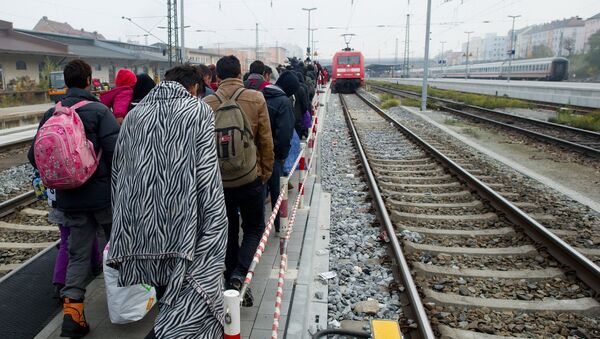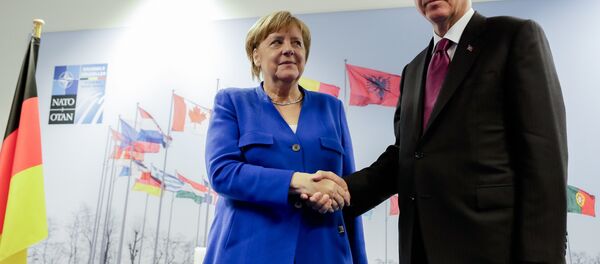Sputnik: What do you make of President Erdogan's visit to Germany for the first time in seven years? What does Erdogan intend to gain from this meeting?
Jana Jabbour: It is clear that this visit has been successful for President Erdogan because all of his objectives have been met. The first objective for him during this visit was the economic one; he actually wanted to appease tensions and to improve relations with Germany at a time when Turkey is obviously experiencing an economic crisis and devaluation of its currency, after all let's not forget that Germany is the third trading partner of Turkey in Europe so for Turkey exports to Germany are really crucial to boost its economy hence, of course, the need to normalize relations with Berlin during this visit and this has been met, this objective has been met because actually relations have improved so far.
READ MORE: Erdogan's Visit to Germany Comes Amid Lack of Enthusiasm to Help Ankara
The second objective of President Erdogan is a political and diplomatic one, he really wants to repair and consolidate relations with European countries and with Germany in particular to counterbalance Turkey's souring relations with Washington. Of course we know that Washington has passed a series of economic sanctions against Turkey and that the two countries have deteriorating relations, so Europe in this context appears as an alternative to the US, hence we could explain this charm offensive of President Erdogan to Berlin.
I would say the third objective of President Erdogan that has been met during this visit is a pure personal one. In fact, President Recep Tayyip Erdogan has always searched for recognition abroad; he always wanted to be recognized as an influential and as a powerful leader in Europe and at the international level and this has been granted to him, because the fact of hosting him in Germany is a recognition of him in a way as a strong leader, a powerful one and a leader who could be a partner of Europe on many issues, so this objective in particular is a big success for Erdogan, it has been met and it's a big success.
Sputnik: Erdogan has said he's not going to kneel under German pressure on those issues — do you think that there is any chance that those differences could be bridged and what will it may take to really make that happen?
Now how can these points of contention and tension can be bypassed and overcome between Germany and Turkey? Actually those countries, despite being at odds with each other, know very well that they are dependent on each other and they need each other. Turkey needs Germany on the economic and commercial side, Turkey needs to export its goods to Germany in order to reboot its economy, and on the other hand, Germany really needs Turkey today to control the immigration flow to Europe and to Germany.
Sputnik: Do you think that Mr. Erdogan will be successful in gaining easier access to the EU for Turkish citizens?
Jana Jabbour: Well this is his objective because gaining this access for Turkish citizens to Europe is a way for him to show that Turkey has become a power today on the international stage and that Turkey is respected as a partner of European countries. Is there a chance that this demand will be accepted by European countries? I highly doubt it. In fact, today everywhere in Europe nationalist and populist feelings are really on the rise and I highly doubt that the European public opinion would accept the granting of free visas for Turkish citizens and a huge majority of Muslims wanting to visit Europe, so I think that's a utopic dream of Erdogan, he can continue on demanding that, but he'll never really get what he wants on this front.
The views and opinions expressed by the speaker do not necessarily reflect those of Sputnik.




